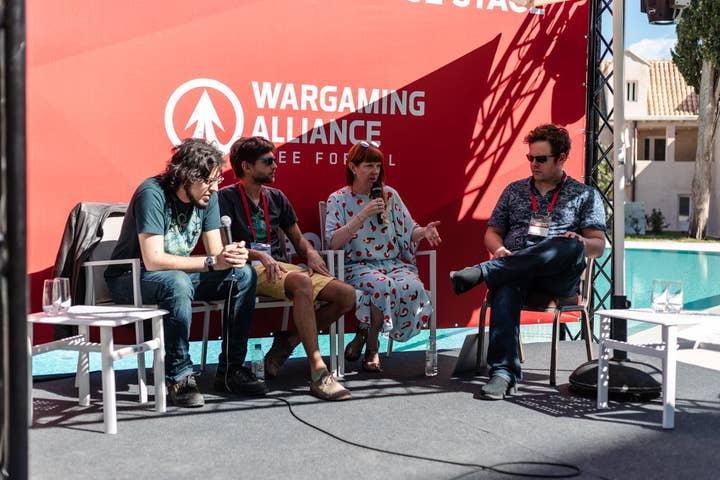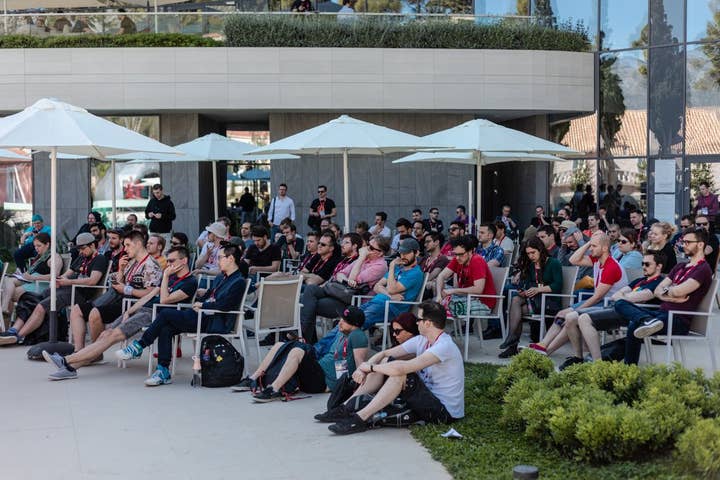"If anybody is going to pick a fight with Steam or create an alternative, the time is now"
At Reboot Develop, Rami Ismail and Robin Hunicke argued that existing digital platforms are not doing enough to represent the diversity and artistry of developers
Few in the industry now question the status of video games as a valid form of artistic expression, and yet supposedly open distribution platforms are guilty of stifling that creativity. At the Reboot Develop conference last week, a panel of independent developers called out Valve, Apple and Google for "double standards" in what they will allow to be sold, and looked ahead to a better, more varied future.
"Games have been punk rocked - 'I made a game in Game Maker about my gender transition. Now I'm an artist'," Funomena's Robin Hunicke said to the audience, referring to the game Mainichi from the independent designer Mattie Brice. "That's punk rock."
Developers with this kind of attitude exist in greater numbers, and they are using the medium to explore new subjects, perspectives and experiences. However, Hunicke pointed out that, "until the industry starts to support art, it will be difficult for those games to become commercial."
Vlambeer's Rami Ismail, another panelist, agreed, and offered the example of a game that he didn't personally want to see necessarily, but one that, if it existed, would be "proof of our industry getting better" in that respect: "A war game where you fight Americans."
"I have blown up my people in increasingly realistic fashion for 29 years of my life... I've never been able to do the opposite"
Rami Ismail, Vlambeer
"I have blown up my people in increasingly realistic fashion for 29 years of my life," Ismail said, echoing a sentiment he expressed about representations of Muslim people at GDC two years ago. "The feature will say, 'Blow up cars with more realistic physics', but also the brown guy standing next to it.
"I've never been able to do the opposite. And that's weird, because there are a lot of people around the world who have some serious problems with America. They've fought wars against them... Brown people don't get to make those games."
Mike Bithell, the designer of Subsurface Circular and the panel's moderator, recalled a first-person shooter made by an Iranian developer that did show conflict from the other perspective, but Ismail replied that those games would not be sold on Steam. Given Valve's dominance in the PC market, not making it onto Steam is effectively a death knell for any independent game.
"We're allowed to have specific versions of artistic expression in games, and they're very much controlled by who is in power in games," Ismail continued. "Which is how it's always worked, but if we're talking about art in games, it's important to realise that the artistic visions that we're seeing are very much a reflection of the people that have power in the industry. And that is, in many ways, the Western world and Japan.
"I'm not saying I want tons of games in which you blow up Americans, but until we see a game like that on Steam I'm pretty convinced that this is not a reflection of the world."

Ismail's concession that the industry has "always worked" in this way is mostly true. The major publishers certainly did control the kinds of games and stories that made it into the hands of the public, but Steam, the App Store and Google Play promised to be the antidote to that throttling of content: open platforms that developers of all sizes and types could access.
In reality, each has a set of content guidelines, which manage to be vague, narrow and contradictory all at once. The GamesIndustry.biz archive is replete with examples of developers who have encountered huge problems in accessing these essential marketplaces, often on the grounds of exploring politics or sex - absolutely vital topics in any commercial art-form you care to name.
Hunicke cited the example of Robert Yang, an independent designer who uses games to explore his experiences as a gay Asian American - exactly the kind of diversity the industry's biggest companies very vocally claim to support. At the Nordic Game Jam, Hunicke said, Yang made a game that tasked players with memorising and describing elaborately drawn penises.
"Too gay for iOS. Too gay for Android. Too gay for Steam"
Robin Hunicke, Funomena
"You had to match them, but you had to describe them," she said. "So everyone around the table was like, 'You know the one that curves to the left with the nice chiaroscuro shading? A little bit turgid, but not super hard?' The goal of the game was to get people to use language that's used very commonly used to talk about women and their bodies and their biology.
"Robert's games can't be on iOS. He can't sell his games about hooking up with dudes because it's 'too gay'," she said. "Too gay for iOS. Too gay for Android. Too gay for Steam. That [Nordic Game Jam] game is just sexy and fun and interesting, and we can't even get that to be okayed.
"When you think about it, that is so un-punk of iOS, Android and Steam to be stopping this kind of stuff from being distributed."
Hunicke challenged the audience to dig through Steam's catalogue, which isn't short on games that objectify the female body or glamorise violence. "Not only is [Yang's game] not allowed, but there's a huge double-standard in the way we publish games," she added. "It's awful."
Before Bithell asked the crowd to field questions of their own to the panel, Ismail noted that, while the panel was supposed to talk about how to make artistic games, "it became about what art we're not hearing, and what art we would love to hear." Fittingly, the first question from the audience probed the subject further still, and raised the idea that Steam is "so unmoderated - except for banning these games. We can't have games about dicks or shooting Americans, but we can have games about wet anime characters."

Hunicke had mentioned Kartridge, the new distribution platform from Kongregate, earlier in the discussion. She expressed a hope that Kongregate CEO Emily Greer would create a storefront with, "a much more artistic and friendly policy about curation, that has an age limit, and a consent language, and things like this. Maybe a female-led platform, made for indies, will solve some of these problems."
Returning to the subject again, Hunicke said that the platform's goal is to create, "a more personality friendly way of curating games, so we can build relationships with our audiences through the platform that's distributing them; that we could have fair representation on the platform, and an ability to understand who's buying our games and reach them."
"This laissez faire model of curation, and the market will solve the problem? It just doesn't work"
Robin Hunicke
This addresses a problem that exists with all platforms, where the holder has too much power over how developers do business and who gets to see their games. Hunicke invoked the image of Zynga "limping along" in the years after Facebook changed its policies. "The platform holder is never your friend," she said, and Kartridge is just one of "several things coming" that will provide the opportunity to tip the balance towards the needs of the consumer and the developer.
"I think in this next period there will be a real battle for our content, based on the idea that we demand some representation, and some free information flow about the customer between the platform and the developer," she said. "It will become in [the platform holders'] best interests to support a better connection between the customer and the developer, because that is how games will actually get sold above the noise. That is how they will find their audience.
"I don't know who's going to win, but I do know that the way they will win is by being more transparent. Because the more transparent we are, the better we are at not trying to sell our game to somebody who doesn't want it. Maybe you want a match-the-dicks game, and you just keep getting sold a screen shake game - 'I didn't want that. I really, really, really want to match dicks.' Okay, great, there you are, and there's three thousand of you. Congratulations Robert Yang, you got a new car.
"This laissez faire model of curation, and the market will solve the problem? We all know how that works. It just doesn't fucking work."
Ultimately, Ismail pointed out, more places to sell your product works in the favour of smaller developers, because it provides more opportunity to reach specific audiences, and more opportunities to be featured on the storefront. He also admitted that, in his entire career in the games industry, the general level of satisfaction with Steam among developers has never been lower.
"I've never seen this low of developer trust in the platform, which is a very odd state of affairs, because I think it is in many ways still the best earning platform," he said. "It's definitely a shift. You can feel something giving under our feet... If anybody is going to pick a fight with Steam or create an alternative, the time is now.
"There is definitely a feeling in the air that the way they work and the way they curate, it's not enough for a lot of players and it's not enough for a lot of developers."
